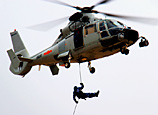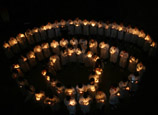
MOSCOW, Jan. 24 (Xinhua) -- With 77 Russian nationals being flown back home from Syria via Beirut on Wednesday, some media reports assumed that a massive evacuation was around the corner.
Local experts say the operation cannot be considered as a signal that Moscow seeks to change its policy toward the conflict-torn country.
NO STANCE CHANGE
Eugeny Grachev, a political commentator with the Voice of Russia radio station, said Russian authorities didn't tone down the scale of the operation because it is not an evacuation by nature.
"There are dozens of thousands of Russian nationals in Syria, the group of 77 is a tiny part of them," he told Xinhua.
Foreign Minister Sergei Lavrov also denied that the move was an evacuation, noting it was arranged according to the requests of those taken back, most of whom were women and children.
The current situation in Syria requires no "emergency actions" from Moscow, Lavrov said, hinting that Moscow doesn't doubt Syrian authorities' ability to hold power.
The operation doesn't necessarily mean a start of massive evacuation soon, analysts said.
Russians and Syrians have seen more than five decades of intermarriages. Currently, there are about 30,000 Russian nationals living in Syria.
Evacuation of such a huge community could not be forceful, as people will choose voluntarily whether to leave or to stay, Grachev said.
Previously, Russia vetoed two U.N. resolutions that could have paved the way for direct military intervention in the Middle East country.
Moscow's policy has led to resentment among Syrian rebels who have been threatening to target Russian nationals and diplomats.
If the situation on the ground continues to deteriorate while the government could not ensure the safety of the civilians, life for those Russians in Syria would become even harder, experts said.
FLEX MUSCLES
Besides the low-profile "back home operation," Russian navy forces have been conducting major drills in the Mediterranean and Black Seas since Saturday.
These maneuvers were made to check whether Russian military forces are ready to fulfill missions in distant waters, according to the Defense Ministry.
Thought it is now difficult to judge whether the drills were pre-planned or made as preparation for the rocky situation in Syria, it is a usual military-diplomatic practice, Grachev said.
"As soon as tension mounts in some regions, world powers send there their warships. This is the so-called 'demonstration of the flag.' In that sense, Russia does nothing unusual," the expert said.
Alexei Malashenko, an expert at Moscow's Carnegie Endowment, said Russia used the war games to flex it military muscles in the region.
Russian warships could hardly change the power balance in military terms if real combat occurs. The influence of Russian fleet's presence could only be political in the area, according to the expert.
Meanwhile, President Vladimir Putin's latest proposal to hold an international conference on Syrian refugees goes in line with Russia's stance to minimize civilian casualties in the armed conflicts, local experts said.
















 Going back home: A standing journey
Going back home: A standing journey


![]()
